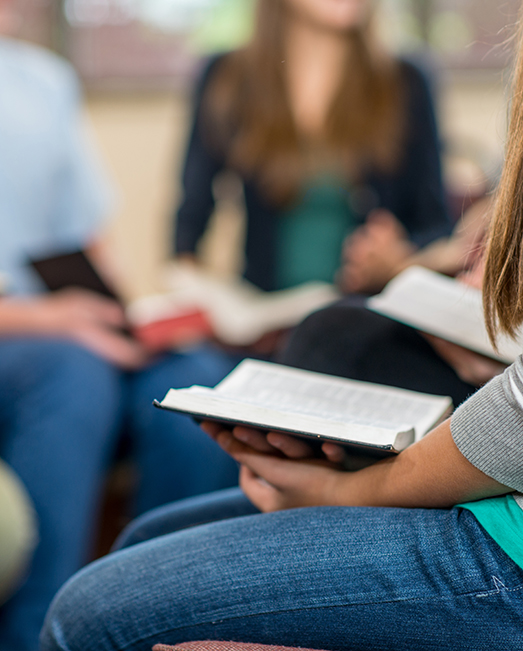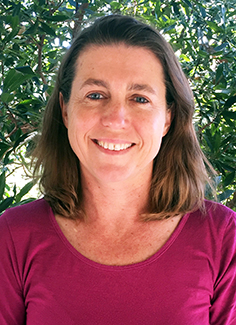Community
Copyright@ Australian Catholic University 1998-2026 | ABN 15 050 192 660 CRICOS registered provider: 00004G | PRV12008
Copyright@ Australian Catholic University 1998-2026 | ABN 15 050 192 660 CRICOS registered provider: 00004G | PRV12008

Book clubs are often dismissed as glorified gossip, drinking and eating sessions, with a small side of book talk. But Dr Maggie Nolan, whose research explores contemporary book club culture, says they play a greater social role.
Australians are among the world’s most enthusiastic readers. Nine out of 10 of us enjoy reading books for interest or pleasure, and most would like to spend more time reading. For Aussies, says The New York Times, “books are bellwethers of great symbolic weight”; they are “tightly linked to Australia’s sense of itself”.
Given our penchant for reading, it should be no surprise that book clubs — the monthly gathering of people to discuss a chosen tome, commonly over a glass of red and some fine cheese — are also popular.
Book clubs, they tell us, are “all the rage right now … [they] are popping up everywhere”. But while they have been labelled “one of the largest bodies of community participation in the arts in Australia”, just how many book clubs operate in our country is anyone’s guess.
“So much of book club activity happens informally in people's homes, so we actually have no idea how many book clubs there are; we know very, very little about Australian book club culture,” said Dr Maggie Nolan, the Deputy Head of ACU’s School of Arts in Queensland.

In 2014, Dr Nolan teamed up with fellow researcher Robert Clarke to observe and interview 32 members of five book clubs reading Kate Grenville's The Secret River, the Australian novel which explored the hostile encounters between convict settler William Thornhill and the Indigenous inhabitants of the Hawkesbury.
Although popular, The Secret River was controversial. While readers and reviewers had heaped praise on the book, literary scholars argued it whitewashed history by inviting readers to sympathise with its white protagonist.
“Amongst all my non-academic friends, people were saying things like, 'This book completely blew me away', or ‘It changed the way I think about myself as an Australian'. It had this massive popular impact,” Dr Nolan said.
“In stark contrast, it was quite brutally panned amongst academic literary theorists, who were concerned that the ‘ordinary’ reader would be duped into being comforted by it, that it would effectively absolve them of white guilt and make them feel better about the dispossession of Aboriginal Australians.”
Nolan and Clarke decided that this massive gulf was worthy of further study. The resulting research project, Book Clubs and Reconciliation, found that so-called “ordinary” readers interpreted books in complex ways. Contrary to the concerns of literary theorists, book club members had nuanced responses to The Secret River, with many saying it forced them to grapple with the issues of Australian history and race politics.
“There is this idea that book clubs are just gossip and drinking sessions, but what we found is that people join them because they want to discuss and debate things they think are important — history, race, identity, politics — and for many, there is no other place for them to do that,” Dr Nolan said, adding that book club members were “prepared for their views to be challenged”.
“I don't want to glorify book clubs or say there is something superior that happens in those spaces, but I do think that academic literary criticism has something to learn from the kind of tentativeness, openness and willingness to engage in dialogue that characterises book clubs.”
Book clubs are, in theory, democratic spaces. In most cases, anyone can join them, or start their own, and once gathered at the host’s house, huddled around the cheese and pinot noir, everyone gets a chance to have their say.
However, Dr Nolan has pointed out in various studies that book club members are overwhelmingly white, middle-class, middle-aged and female. And this, she says, raises a valid criticism of the book club phenomenon.
“They’re almost always made up of highly educated, privileged people of the professional and managerial class, so while book clubs are open, the nature of them can make them quite exclusive,” she said.
Book club members tend to be part of what researcher Wendy Griswold has termed “the reading class”, which is “modest in size but intense in its literary practices”.
“Griswold talks of the reading class as an elite group of people for whom reading is really important, and while they are small in number, they have a lot of cultural power,” Dr Nolan said.
“And that's the dynamic I'm wrestling with at the moment, because the question is, are book clubs something that can actually alter civic space to allow new voices into it, or are they just the same people who already have cultural power, who already have a voice, having more of a say?”
The Townsville-based Murri book club — a book club for Indigenous Australians — is perhaps the most unique reading group that Dr Nolan has studied.
In a recent article, Dr Nolan described how the book club had “taken a communal institution so often associated with white, middle-class culture and remade it as a force for decolonising contemporary cultures of reading”.
Like many Indigenous people who commit to reading, Murri book club members were concerned they might be sacrificing their cultural values, because the imposition and authority of the written word could be seen to clash with their own oral story-telling culture. This cultural baggage meant they had a more complex and ambivalent relationship with reading than others.
“Everybody thinks that books are good for you, that you should read more, but for the Murri book club members it’s a little trickier because in the era of assimilation, Indigenous Australians were actively prevented from speaking their languages and forced to read in English,” Dr Nolan told Impact.
“They know that the culture of reading was one of the ways their oral culture was undermined, that it was one of the tools of colonialism, but they’re also much more aware that reading is connected with power, and books are one way for them to get access to ideas and power.”

One way the Murri book club resembles others Dr Nolan has studied is that its members are all part of the professional class; they’re all tertiary-educated, employed in white-collar work, and all but one is female.
However, unlike the Reconciliation book club on which they were originally modelled, the Murri book club wasn’t all that eager to tackle issues of Indigenous marginalisation and displacement. The group’s founder, Janeese Henaway, told Dr Nolan that members did not want to have “heavy discussions on Indigenous issues”. Rather, they “wanted a light, entertaining and enjoyable experience”.
“Almost all of them work in jobs where they help people to deal with the social, political and cultural issues of Indigenous marginalisation,” Dr Nolan said. “The last thing they need once a month is to read a book to help make them more aware of the issues, because they live those issues.”
Not all keen readers want to talk publicly about the books they read. There are others for whom reading is an intensely private pursuit.
“Books are a private matter,” wrote The Independent’s Alice Jones, “an opportunity to retreat from the chatter of modern life and take refuge in one's imagination.”
“My advice for joining a book club — don’t bother,” Jones said. “The best way to read is on your own.”
This is what Book Clubs author Elizabeth Long has termed “the ideology of the solitary reader”. It’s the class of reader who “feels that their relationship with a book, its characters and the author is too intimate to share”.
“I totally understand there are people who want to keep their reading as an individual pursuit, which is completely fine. I don't have a judgement about that,” Dr Nolan said.
“But if you’re a book club member, you’re a person for whom reading is quite central to your sense of self, in so far as you are willing to put aside a night a month to spend time talking about books because you want a different kind of a relationship with books from the solitary reader.”
Dr Nolan argues that book clubs play a significant public role by providing a safe place to test ideas and discuss the political, moral and ethical issues raised by works of literature.
“It's not uncommon to hear people say, 'books saved my life',” she said. “I don't want to overstate it and say that book clubs can change the world, but I also don't want to understate it, because certainly some people in book clubs say it's the event they most look forward to each month. I think there are good reasons to take seriously the role that book clubs play in contemporary Australian life.”

Copyright@ Australian Catholic University 1998-2026 | ABN 15 050 192 660 CRICOS registered provider: 00004G | PRV12008